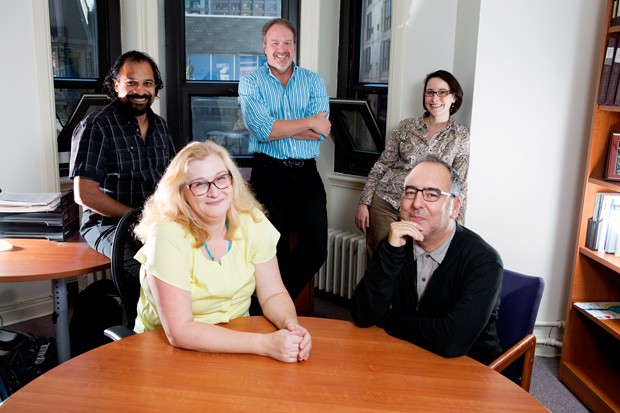“The school is in really great shape”
 The Graduate Studies decanal team, clockwise from left: Vivek Venkatesh, associate dean of Academic Programs and Development; Brad Nelson, associate dean of Student Affairs and Postdoctoral Studies; Ketra Schmitt, director of the Individualized Program (MA and PhD); Luca Caminati, associate dean of Recruitment and Awards; and Paula Wood-Adams, dean of Graduate Studies. Photo by Concordia University
The Graduate Studies decanal team, clockwise from left: Vivek Venkatesh, associate dean of Academic Programs and Development; Brad Nelson, associate dean of Student Affairs and Postdoctoral Studies; Ketra Schmitt, director of the Individualized Program (MA and PhD); Luca Caminati, associate dean of Recruitment and Awards; and Paula Wood-Adams, dean of Graduate Studies. Photo by Concordia University
Paula Wood-Adams was named dean of Graduate Studies today, for a term lasting until June 30, 2018. She sat down with us to discuss her new role.
You acted as the interim dean from July 2012 to August 2013. What kept you busy?
Paula Wood-Adams: I’ve been really focused on getting the school ready to take the next step in terms of developing a strong presence for graduate studies for Concordia in the national arena.
I’ve been working with my team of academics and staff: putting together our objectives, making sure that we're all comfortable with the direction we’re taking and that each person understands their role. We had a few internal things to sort out, as well, which we dealt with.
Right now, the school is in really great shape. We have truly dedicated staff here, and my team of associate deans — they’re all perfect.
What are your immediate plans for the school?
PWA: Concordia's future, in terms of its reputation, is really going to be very much linked to its research profile. You can't have great research going on without great graduate programs and graduate students.
So while the university is growing its research profile, we have to be growing and evolving the graduate offerings — the type of students that come — and expanding the list of places where we're known, and fields for which we’re known.
That's why having a strong School of Graduate Studies is so important. We can support the faculties in their development and ensure that the central structures allow for the best graduate student experience.
How do you plan to encourage this evolution?
PWA: There are, perhaps, some more areas where we could have PhD programs. The way I see it is, if a department or a research area has an active presence in research — they're publishing, creating, bringing in grants — that area probably needs a PhD program. There are some areas in the university like that without PhD programs, so there's potential there.
I would also like to grow the percentage of research students and postdoctoral fellows in the graduate population. That might mean an overall growth in population, or it might not. But I would definitely like to increase the percentage of grad students who are conducting research, especially PhD students and postdocs. They're the ones who contribute in an enormous way to our research.
On recruitment trips, do you find that prospective students are aware of Concordia’s range of offerings?
PWA: I find when I'm outside of Montreal, or away from the local area, there's less knowledge about what we're doing in science and engineering. When students come to see me, they’ve often heard about communication studies, or fine arts, or psychology, but they haven't heard much about the physical sciences, or biology and engineering.
I always try to make sure that students know about our new facilities, like the Centre for Structural and Functional Genomics, the PERFORM Centre, or the new Solar Simulator and Environmental Chamber.
You have a PhD and MEng in Chemical Engineering from McGill University. What did you most enjoy about your own graduate school experience?
PWA: I felt like it was the time in my life where I could really focus on learning — since then I've never been able to just do that. I loved it.
I met students from all over the world, and I went to conferences. The first conference I attended was in 1993: a conference organized by the Society of Rheology in Boston. There were about 100 attendees, and four of us were women. Now, it's completely different. It's not half and half, but it's maybe 30 per cent. I see a lot of young female students in the area. It was nice to see that evolution.
What advice do you have for graduate students at Concordia?
PWA: I chose to do things that really scared me, that I didn't think I could do, and I've never regretted it. I have done that at every step, including choosing this job! It has allowed me to learn things that I would never have learned if I had not been willing to risk failure.
You have to take risks, and you have to do what scares you, but then you have to work super hard, because you really don't want to fail.
Are you excited about your new role? This is a big job…
PWA: It is. But I love it. I really do. Every morning I wake up and I'm happy to go to work. I'm never bored!